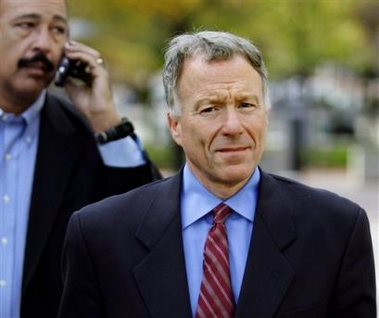|
Woodward claim on CIA leak disputes charge
(AP)
Updated: 2005-11-17 08:45 Special prosecutor Patrick Fitzgerald, in announcing the charges, portrayed
Libby as the first high-level government official to reveal Plame's identity to
reporters in summer 2003.
Legal experts said Wednesday the disclosure that Woodward had a source — who
was not Libby — could be used by Libby's lawyers to bolster their claim that
Plame's identity was common knowledge among government officials and reporters.
"Much was made of the fact that Libby set all of this in motion, that he was
the first government official to reveal this," said former Deputy Attorney
General Eric H. Holder Jr., now a defense attorney in Washington.

I. Lewis 'Scooter' Libby, Vice President Dick
Cheney's chief of staff, walks to the U.S. District Court in Washington,
Wednesday, Nov. 16, 2005, accompanied by his attorney Theodore V. Wells
Jr., at rear.[AP] | "As a defense attorney, I'd try to make as much of this as I possibly could
to call into question the completeness of the investigation and raise concerns
about a rush to judgment." However, he said, "I'm not sure at the end of the day
that it hurts the trial of this case."
Robert W. Ray, a former independent counsel, said the Woodward disclosure
won't help Libby if his defense is that he wasn't the only official leaking
Plame's identity. "The point was: Did you make false statements and perjure
yourself?" Ray said.
The Washington Post said Wednesday that Woodward had given a sworn deposition
to Fitzgerald on Monday. According to the Post, Woodward's source told
Fitzgerald after Libby's indictment that the source had talked to Woodward in
mid-June 2003. Woodward also talked to Libby and White House Chief of Staff
Andrew Card at about the same time in connection with his book. But Woodward
said in a statement printed in the Post that he didn't recall talking about
Plame with Card or Libby.
Card, Libby and the remaining source — still unidentified — released Woodward
from promises of confidentiality so he could answer Fitzgerald's questions. But
the remaining source — at least as of Wednesday — refused to allow Woodward or
the Post to identify him or her publicly.
Fitzgerald's investigation was bogged down for months while he sought
testimony from reporters who had gathered information about Plame, whose husband
was sent to Africa by the CIA in early 2002 to check out allegations that Iraq
had tried to buy uranium "yellowcake."
Judith Miller, a former New York Times reporter, spent 85 days in jail last
summer after refusing to testify before a grand jury about her conversations
with Libby in June and July of 2003.
Elsewhere on Wednesday, Libby spent several hours at the federal courthouse
in an area designated for lawyers to review classified or sensitive government
evidence.
Accompanied by his legal team, Libby walked into the courthouse without the
crutches that he'd been using during a court appearance two weeks ago when he
pleaded not guilty.
Other top Bush administration officials, including Karl Rove, have testified
before the grand jury.
Mark Corallo, a spokesman for Rove's legal team, said Rove was not the
official who talked to Woodward. Rove was referred to, but not by name, in
Libby's indictment as having discussed Plame's identity with reporters.
Woodward is now assistant managing editor of the Post. In October, he was
dismissive of the Plame revelation, telling CNN's Larry King that the damage
from her exposure was "quite minimal."
Meanwhile, The Associated Press on Wednesday joined other news organizations
in asking U.S. District Judge Reggie Walton to deny a court motion by Fitzgerald
for a blanket protective order keeping all pretrial evidence in Libby's case out
of public view.
|